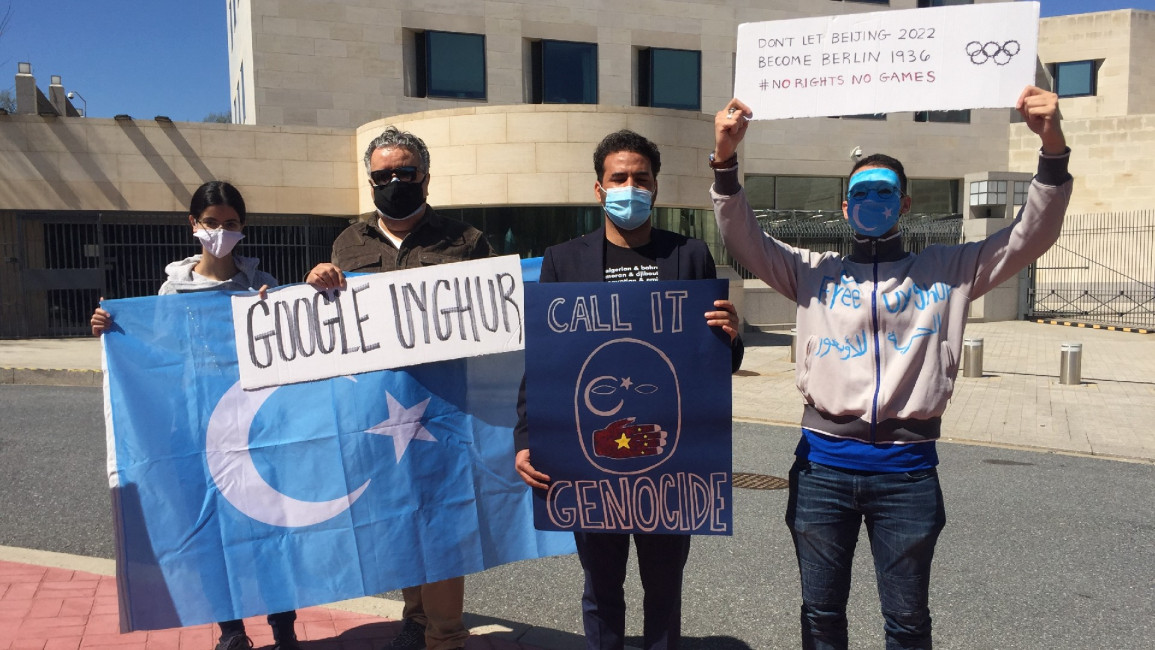Washington: Uighurs demand urgent action against Beijing’s ‘genocide’ at Chinese embassy protest
Washington: Uighurs demand urgent action against Beijing’s ‘genocide’ at Chinese embassy protest
Dozens of Uighurs and supporters gathered outside the Chinese embassy in Washington to raise awareness of human rights abuses against the religious and ethnic minority group.
3 min read
Activists protest in Washington, DC against China's treatment of its Uighur minority.
WASHINGTON: Around 50 Uighurs and their supporters gathered outside the Chinese embassy in Washington on Tuesday to raise awareness of Beijing's human rights abuses and push the US government to take further action to pressure China on the issue.
"Every Uighur has a family member in a camp," said Elfidar, an activist with the Uyghur American Association, using only her given name due to concerns for her family in China and referring to reported forced labour camps in the country.
There are an estimated one million Uighurs detained in the Xinjiang province of China, where around 12 million have lived since long before modern statehood.
Xinjiang is the country's only Muslim-majority area, standing out from the rest of China due to its cultural uniqueness of language, dress, and customs.
"China is not open to diversity. It wants people to be like robots. They just want people to identify as Han Chinese," said Elfidar, referring to the country's predominant culture.
For the past several years, China has increasingly been clamping down on those who identify as Uighurs with Beijing arguing the measures are to tackle religious extremism.
Critics point to satellite images showing the expansion of camps and forced labour.
China's actions are increasingly being referred to as genocide, a term used in the US State Department's 2020 human rights report.
|
|
This was released just one week after the US, UK, EU and Canada issued sanctions on Chinese leaders due to the reported human rights violations, charges Beijing has consistently denied.
"There is so much denialism. I've lost contact with my parents and my relatives who have been taken to the so-called re-education camps," said Mustafa Aksu, who came to the US as a student and who now works with the Uyghur Human Rights Project.
He added that he grew up learning and using his language in school, which is now forbidden in public education.
Mosaab Sadeia, a student activist with Free Uyghur Now, said there is growing interest in the situation of the Uighurs from those outside the community, a possible sign that more policy changes might be on the horizon.
At the beginning of this year, House and Senate bills were reintroduced - both called the Uyghur Forced Labor Prevention Act - which would ban goods made in the Xinjiang region unless it could be proven forced labour was not used in the manufacture of goods.
Activists said this would be an important step in recognising the plight of the Uighurs.
Brooke Anderson is The New Arab's correspondent in Washington D.C., covering US and international politics, business and culture.


![President Pezeshkian has denounced Israel's attacks on Lebanon [Getty]](/sites/default/files/styles/image_684x385/public/2173482924.jpeg?h=a5f2f23a&itok=q3evVtko)



 Follow the Middle East's top stories in English at The New Arab on Google News
Follow the Middle East's top stories in English at The New Arab on Google News


